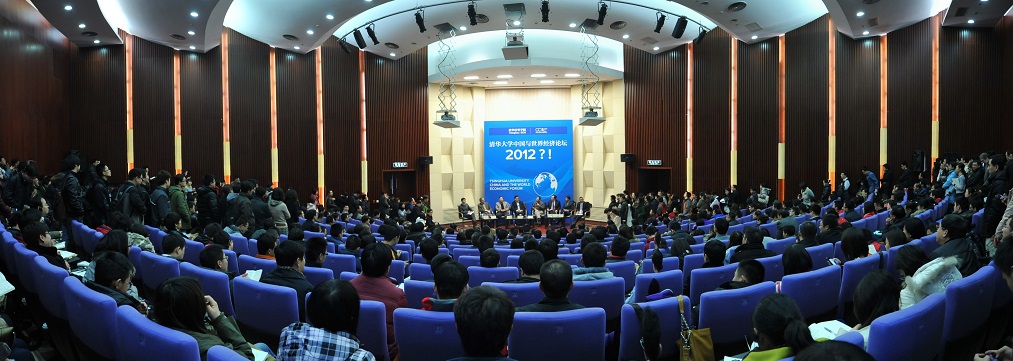No. 10 | 2012?!

On January 8, 2012, Tsinghua University Center for China in the World Economy (CCWE) held its tenth forum, entitled, “2012 ? !” The forum focused on the numerous challenges that face both the world and Chinese economies in the coming year and the many different elements and factors that will have an influence on both China and the world. Major issues addressed included the future of the Euro zone; the upcoming presidential election in the United States; China’s international relations; the slowdown of the economic growth rate in China; and the future of China’s economic development. Professor David Daokui Li, Director of CCWE and Member of the State Monetary Policy Committee, served as the forum’s moderator.
Forum panelists included: YUAN Gangming, Senior Research Fellow, CCWE and the Chinese Academy of Social Sciences; XU Shanda, Deputy Director General, Bureau of China Taxation Affairs; WANG Jian, Secretary-General, China Society of Macroeconomics; CHEN Yunfeng, Secretary-General, China Economic Alliance; PENG Wensheng, Chief Economist, China International Capital Corporation Limited (CICC); HU Zuliu, Chairman, Primavera Capital; SUN Liping, Professor, Department of Sociology, Tsinghua University; JIN Canrong, Assistant Dean and Professor, Department of International Relations, Renmin University; ZHU Feng, Professor, School of International Studies, Peking University; YAN Xuetong, Director, Institute of International Studies, Tsinghua University; Marc Uzan, Executive Director, Reinventing Bretton Woods Committee; Keith Richburg, China Bureau Chief, The Washington Post; and Andrew Polk, Resident Economist, The Conference Board.
The forum began with the international section with Marc Uzan, Keith Richburg, Andrew Polk, JIN Canrong, ZHU Feng and YAN Xuetong. In terms of the euro crisis, it was stated that it is not just a problem for Europe, but for the entire global financial community and that it is necessary to the currency’s survival to regain confidence on a global level. In regard to the upcoming presidential election in the United States, the view was expressed that the problem in the U.S. is political as there is an incredibly sharp philosophical divide between the Democrat and Republican parties on major issues such as taxes, entitlements and the overall size of the government, making this election particularly important. In terms of the overall world economy, it was forecasted that that like in 2011, it will continue to see slow growth but will not go into a recession. One difference is that the first half of 2012 will be characterized by slow growth but be more optimistic in the second half, whereas 2011 started cautiously optimistic but suffered from slower growth in the second half. In the area of international relations, it was predicted that there will be further troubles in 2012 in the Sino-U.S. relationship because of the unstable situation of East Asia, China’s military modernization and the upgrading of China’s industry. It was generally agreed upon that while the power of the U.S. is declining and China’s is rising, U.S. domination on international affairs will continue for decades. It was also expressed that China isn’t ready to lead the world as China’s soft power is failing to keep pace with economic development.
From there, the forum moved onto the domestic portion. It was explained that the main reasons for the slowdown in China’s economy are structural adjustment, urbanization, real estate bubbles, the 2009 stimulus package and no major reform. The concern was voiced that the reason for China's rapid development in the past thirty years has been passion for reform, but that passion is now dying out and that the biggest enemy of future reform is vested interests. In terms of the fiscal and tax system, it was emphasized that it is difficult to achieve the goal of rapid income growth in the “Twelfth Five-Year Plan” and that the reform of building a more centralized budgetary system is the ideal goal for the future. The real estate market was also of great concern, with some worrying that prices have the potential to decline by as much as 30-50% in 2012 if there are no changes in the policy restrictions on buying houses. Other issues panelists expressed concern over include the income distribution gap between the rich and poor, as well as possible capital flight from China in the near future, which would make it more difficult to implement effective macroeconomic policies. Overall, it was generally agreed that domestic reform and the pace of structural adjustment are keys for the Chinese economy moving forward.
The forum also featured the release of the most recent economic report produced jointly by CCWE and the HKUST Center for Economic Development. The report forecasts the economy for 2011 and 2012, covering GDP, CPI, M2 supply, import and export and fixed asset investment. The report predicts that China experienced a GDP growth rate of 9.3% in 2011 and will have a rate of 8.4% in 2012, a modest slowdown from the 10% growth experienced in 2010. CPI declined from its high level in the first half of the year to 5.4% overall in 2011 and will be 2.96% in 2012. M2 will grow by 12.6% and 13.1%, much slower than 2010, which saw a growth rate of nearly 20%. The growth rate of exports decreased to 20.4% in 2011 and will further decrease to 15.2% in 2012, while the growth rate of imports will remain relatively steady at 25.7%, and then 20.3%. In 2011, the trade surplus decreased sharply to 2.1% of GDP, and will further decrease to 1% in 2012. Fixed asset investment saw its growth rate remain relatively high at 24.3% in 2011 and will then decline to 22.2% in 2012.
As a timely and effective platform, Tsinghua University will continue to invite extraordinary policy-makers, experts and business leaders -- domestic and international -- to address current and long-term Chinese domestic issues in relation to the international political and economic environment. The objectives of the forum are to brainstorm/inform and provide a solid basis for policy debate and recommendations.




